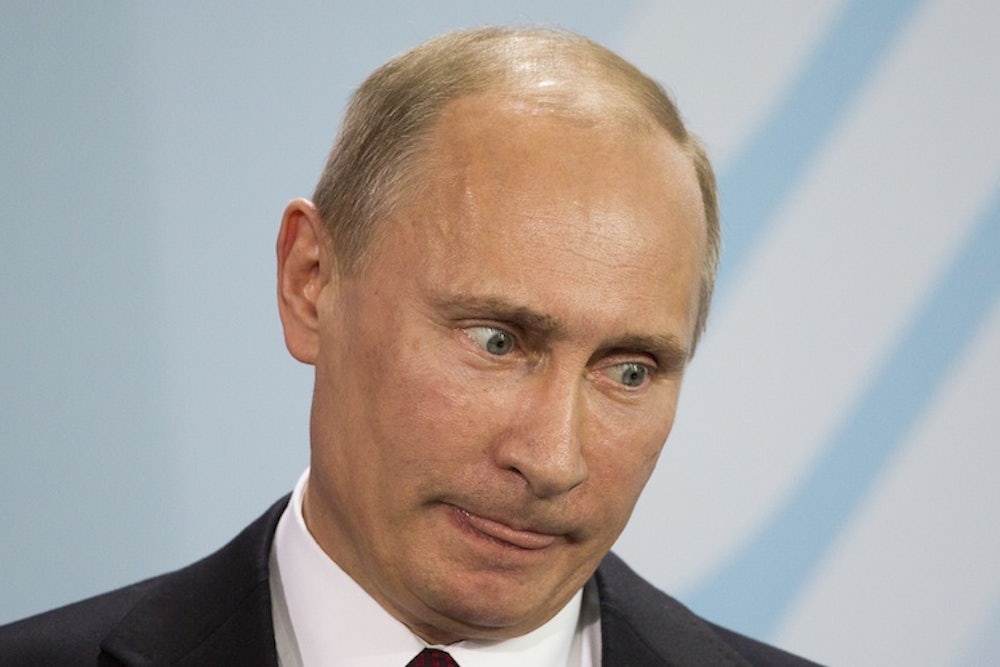Earlier this month, NPR’s Shankar Vedantam floated the idea that something called "prospect theory" could explain Russian President Vladimir Putin’s invasion of Crimea. A behavioral economic model developed in the late 1970’s, the theory states that people are more cautious when they have the upper hand and riskier when they don't. If this indeed explains Putin’s actions, it would mean he perceives Russia as losing power in the world, and is willing to take risks—like annexing Crimea, and perhaps even more of Ukraine—to recover what his nation once lost.
Soviet Premiere Nikita Khrushchev gave Crimea as a gift to Ukraine in 1954, and Ukraine gained its independence from the Soviet Union in 1991, but Crimea's population has remained predominately ethnic Russian. That's why Putin, like many other Russians, believes that “Crimea has always been an integral part of Russia in the hearts and minds of people. This is a conviction passed down on the basis of truth and justice from generation to generation.” Never mind that this is false: Stalin essentially stole Crimea from the Tatars. But Putin considers Crimea a loss nonetheless—both of Russian influence and of previously Russian territory—and now he's willing to flout international law to reclaim it.
Rose McDermott, a Brown University professor and author of Risk-Taking in International Politics, says that when applied to international relations, prospect theory is more than a simple choice between a loss and a win; it’s a struggle to maintain the status quo. “People are so averse to loss that they will really take a lot of risks to come back to the status quo—meaning things as they’ve been previously, but it can also relate to all kinds of things,” says McDermott. “It can relate to your level of aspiration where you think things should be, given some kind of social comparison like where somebody else is, or some kind of historical precedence of where you think it should be.”
In political scenarios, the status quo is interpreted differently depending on the biases of the people involved. In the paper “Psychology and International Relations Theory,” co-author James Goldgeier writes that this especially becomes a problem when interpretations of the status quo are by those “who are less fixated on the world that is—and prone to give more weight to counterfactual worlds that could or should have been.” Instead of seeing the riskier choice as greedy or self-serving, they instead see it as an attempt to undo losses caused by other nations.
Putin's assertion that the collapse of the Soviet Union was the “greatest geopolitical tragedy” of the twentieth century, and his opinion that Ukraine is not a real country certainly reveals a disappointment in the status quo. It’s possible that the move to annex Crimea is Putin’s attempt to undo part of this loss. But there may be other losses, too. The potential of an energy-independent Ukraine not only threatens Putin’s dream of a Eurasian Union but also Russia’s own economic position. Ransoming gas supplies has been essential to keeping Ukraine from making deals with the E.U. and exiting Russia’s sphere of influence.
The decline of Soviet Union–era glory, of energy dominance, and of land itself—these are all losses that, according to prospect theory, could explain Putin's rash behavior of late. But although the theory is widely considered the best way to estimate how people evaluate risk, it is hardly an infallible way of interpreting international politics. New information, changing participants, and the evolving values of policymakers makes it difficult to completely pin a scenario to a specific political theory. However, Putin’s actions seem to fall in line with what prospect theory predicts, and with Ukraine’s decision to pull military forces from Crimea, it seems that Putin’s gamble has paid off—for now.
But this raises a new question: How will Ukraine respond to its loss of Crimea? “You can imagine that people on the other side of the debate also see the secession of the Crimean territory as a loss," McDermott says. "If you have these decision makers who both see the situation as a loss, they’re more likely to take risks. And when you have two people who are taking risks, you escalate the possibility of conflict.”
